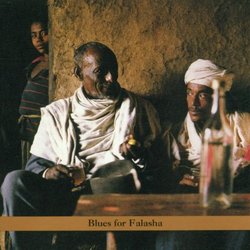The righteous one
Case Quarter | CT USA | 01/29/2008
(4 out of 5 stars)
"blues for falasha, music in 4 parts -- 1) the old book, 2) rituals, 3) cold water and dirt, and, over 28 minutes, the longest section, 4) seed sounds -- is recorded on john zorn's label tzadik: radical jewish music. the name of glenn spearman appears in white letters embossed on a golden star of david. glenn spearman's mother is jewish.
the old book, a background chant over which spearman recites an original poem, concludes with a honking tenor sax evocative of a shofar. rituals opens with a groaning, my guess, made by either the prepared piano or the bass. john zorn refers to spearman's group as the double trio (ornette coleman's classic, free jazz, used a double quartet), consisting of 2 saxophonists, a pianist, a bassist, and 2 drummer/percussionists. both saxophonists play softly in unison and then the piano and percussion chime in, the droning groan fades and the other instruments continue on thru cold water and dirt.
the poet, nathaniel mackey, in the preface of his book, splay anthem, describes glenn spearman as 'a san francisco bay tenor saxophonist...who died in 1998 at age 51, a saxophonist in the coltrane tradition, a tradition worked and ramified by such musicians as shepp, albert ayler, pharoah sanders, and, of particular importance to spearman, frank wright, with whom he studied and worked in paris in the 1970s. ...glenn's music could be pointedly echoic. toward the end of his 1993 composition "thinking of frank," he quotes from the piece wright wrote in memory of trane "one for john." here echo is homage, lineage, a school of ancestors...' the falasha are a jewish hamitic people of ethiopia who claim descent from menelik I, the son of solomon and the queen of sheba. glenn spearman's father is african american.
seed sound, as mackey might say, echoes the music of john coltrane. you could say it's in the spirit of coltrane's meditations, the building up rapid playing of screeching, honking horns to blend with piano and heavily strummed bass, the piano growing in pace and intensity joining the screeching horns and loud banging drums. spearman published his music under the name: ascension publication, undoubtably moved by coltrane's ascension. the screeching rises to tumbling drums and the piece ends with a meeting of the 2 horns and the return of the chanting voices.
larry ochs, pianist for the double trio, writes in the linear notes that he believed blues for falasha marked the end of one kind of free jazz focus for glenn spearman as a saxophonist, and the explorations in new directions.
unfortunately, we'll never know where spearman's explorations would have taken him, as well his listeners. what we do have is something echoic and indicative of spearman's journey here in blues for falasha, music well worth a listen.
"


 Track Listings (4) - Disc #1
Track Listings (4) - Disc #1